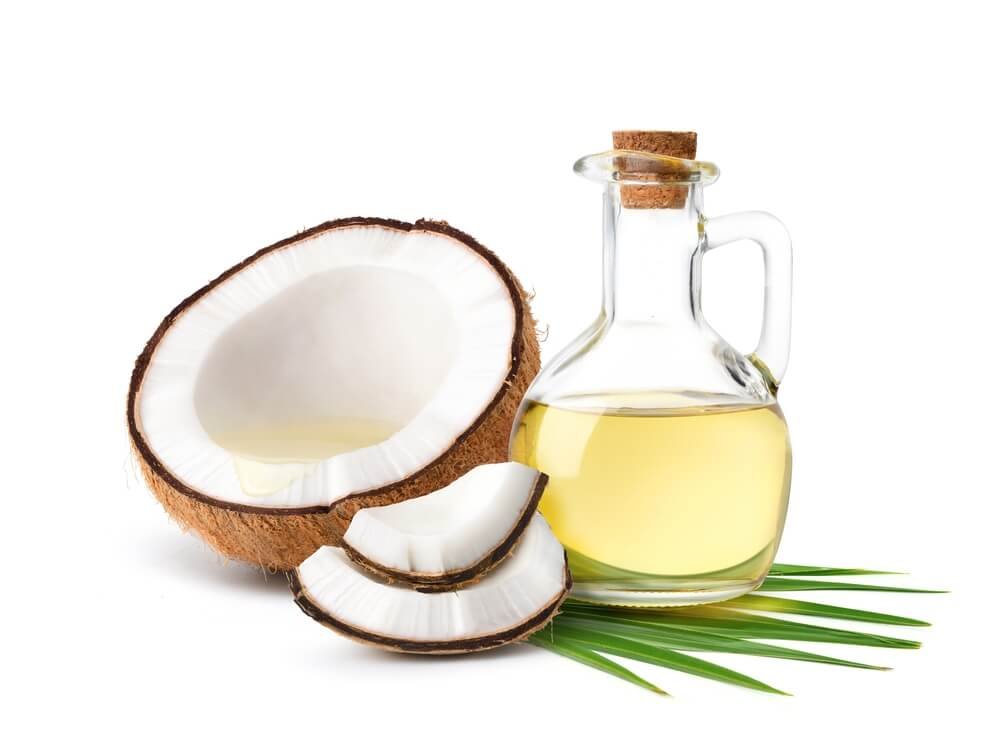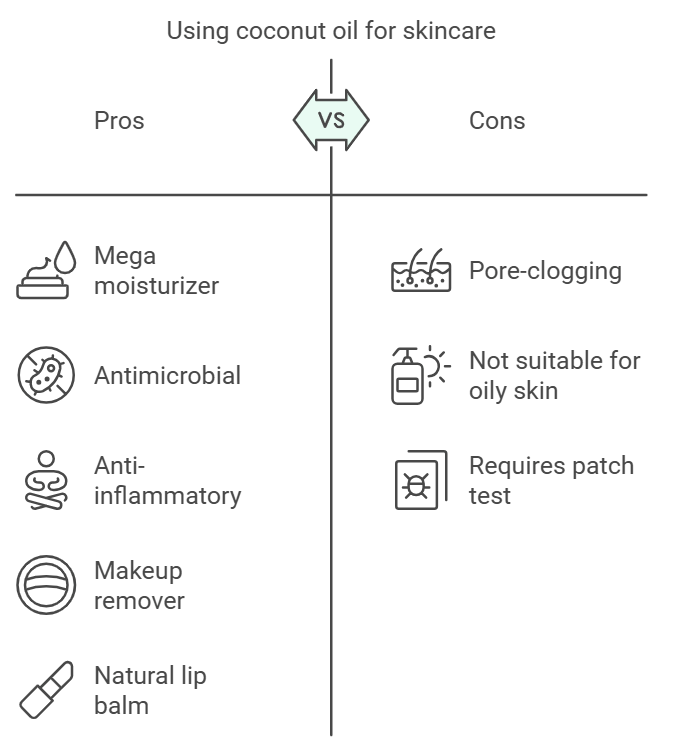Hey there, skincare enthusiasts! Coconut oil seems to be everywhere, right? From smoothies to hair masks, it’s touted as a miracle cure for almost everything. But what about using it on your skin? Should you be slathering it on or steering clear? Let’s break it down!
Coconut Oil Basics: What’s the Deal?
First things first, what exactly is coconut oil? It’s a natural oil extracted from coconuts and it’s solid at room temperature, but melts easily when warmed up. It’s a popular ingredient in cooking and baking because of its unique flavor. But it’s also gained fame for its potential skincare benefits.

The key to coconut oil’s skincare magic lies in its makeup. It’s packed with saturated fats, particularly medium-chain fatty acids (MCTs). These MCTs, especially lauric acid, are known for their antimicrobial properties, meaning they can help combat pesky bacteria and fungi on your skin. Other awesome fatty acids in coconut oil include caprylic acid, capric acid, and linoleic acid, all contributing to its moisturizing, soothing, and protective qualities.
So, Is Coconut Oil Actually Good for Your Skin?
The short answer? It depends! While coconut oil has amazing potential, it’s not a one-size-fits-all solution. Let’s dive into the good, the bad, and the in-between.
The Good Stuff:
- Mega Moisturizer: Coconut oil is like a drink of water for thirsty skin! It helps your skin retain moisture by reducing transepidermal water loss, making it ideal for dry skin conditions like eczema. Studies even show it can be just as effective as mineral oil at keeping your skin hydrated!

- Bye-Bye, Bacteria: Remember those antimicrobial MCTs we talked about? They act like little warriors, fighting off harmful microorganisms that can cause infections and acne.
- Soothes and Heals: Coconut oil has anti-inflammatory properties that can calm irritated skin and help speed up wound healing. Plus, its antioxidant power combats free radicals, those pesky molecules that can damage skin cells.
- Makeup Remover Extraordinaire: Coconut oil gently removes makeup, even the waterproof kind! Just be sure to cleanse afterward to avoid clogged pores.
- Natural Lip Balm: Keep those lips smooth and happy with a dab of coconut oil. Its moisturizing and protective properties make it a fantastic natural lip balm. Bonus: it’s safe to eat!
The Not-So-Good Stuff:
Pore-Clogging Potential: This is where coconut oil can be a bit tricky. It’s comedogenic, meaning it can clog pores and potentially worsen acne for some people. If you have oily or acne-prone skin, use it with caution and always do a patch test first!
Coconut Oil and Your Skin Type: A Quick Guide
- Dry Skin: Coconut oil is your BFF! Lather it on after showering and use it liberally as an overnight treatment for extra dry areas.
- Oily Skin: Use sparingly, if at all. You could try a tiny bit as a makeup remover or mix a drop into your moisturizer.
- Sensitive Skin: Proceed with caution! Always do a patch test before applying to larger areas.
- Mature Skin: While more research is needed, coconut oil’s potential collagen-boosting properties might help improve elasticity and minimize the appearance of wrinkles.
Picking the Right Coconut Oil: Go for the Gold!
Not all coconut oil is created equal. When it comes to skincare, virgin or unrefined coconut oil is the winner. It’s minimally processed, retaining more of its natural goodness and beneficial nutrients.
Coconut Oil Myths: Busted!
Let’s debunk a few common misconceptions:
- Myth: Coconut oil can remove stretch marks.
- Fact: It’s a great moisturizer, but it can’t erase stretch marks. It might help improve their appearance, but they won’t disappear completely.
- Myth: Coconut oil is a sufficient sunscreen.
- Fact: Coconut oil offers minimal sun protection, but it’s not a substitute for a broad-spectrum sunscreen with an SPF of 30 or higher.

Coconut Oil for Skin – It’s a Personal Choice!
Coconut oil can be an amazing addition to your skincare routine, but it’s essential to use it wisely and pay attention to your skin’s individual needs. Some use it for preparing homemade skincare products and may be you are one of them too. Know the facts first before jumping right in! For knowing more about Homemade beauty or DIY Beauty, you can check out our DIY Beauty section.
If you have any doubts or concerns, chat with your dermatologist. They can provide personalized advice based on your skin type and concerns. And if you’re really keen to know more about what we just discussed, read this.
Happy moisturizing!
Is coconut oil good for your skin?
Coconut oil can be beneficial for skin, especially for moisturizing and treating dry conditions like eczema. It contains fatty acids like lauric acid, which offer antimicrobial properties, helping to combat acne-causing bacteria and soothe irritated skin. However, it’s not suitable for everyone, particularly those with oily or acne-prone skin.
Can coconut oil help with acne?
Yes, coconut oil may help with acne due to its antimicrobial properties, especially from its high content of lauric acid. It can kill bacteria on the skin that contribute to acne. However, it’s important to patch test before use, as coconut oil is comedogenic for some people, potentially clogging pores and worsening acne.
Is coconut oil a good moisturizer for dry skin?
Yes, coconut oil is an excellent natural moisturizer for dry skin. It helps lock in moisture and prevents water loss from the skin’s surface, making it ideal for dry, flaky skin or conditions like eczema. It can also help heal damaged skin by promoting a smoother texture.
Can coconut oil be used for sensitive skin?
Coconut oil may work well for sensitive skin in many cases, as its anti-inflammatory and soothing properties help reduce redness and irritation. However, some people with very sensitive or allergy-prone skin may experience a reaction. Always do a patch test before applying it to your face or large areas of your body.
Are there any risks or side effects of using coconut oil on skin?
While coconut oil is generally safe for most people, it can cause breakouts or irritation for those with oily or acne-prone skin, as it can clog pores. Additionally, those with coconut allergies should avoid using it. It’s essential to patch-test before regular use to prevent adverse reactions.





Leave a Reply